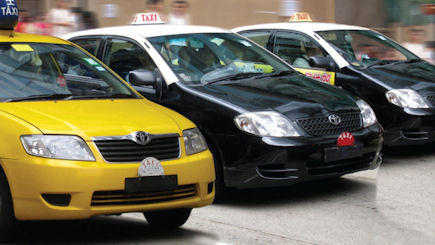This article first appeared in the Sep/Oct 2014 issue of World Gaming magazine.
Taxis have become a huge problem in Macau. Not only are there not enough of them to fulfil demand, unscrupulous drivers are taking advantage of visitors and frustrating the locals by refusing short fares, taking lengthy “detours” and demanding off-meter fares of as much as 10 times the legal price. WGM takes an in-depth look at the problem.
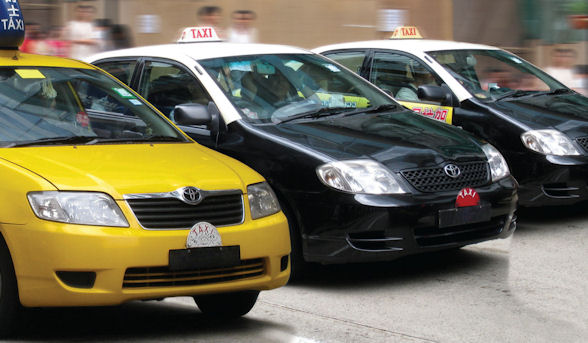
The problem of finding a taxi in Macau has existed for a number of years without any real signs of improvement. In fact, things have become worse than ever over the last year or two and especially in the last six months. Bad behavior in the taxi industry continues to flourish and spread like a cancer, frustrating locals and tourists alike and giving the Macau tourism industry a black eye it doesn’t need. If it continues unabated, Macau will no longer be renowned as one of the world’s tourism and leisure centers but as the world’s “rip-off center”.
Here are five sins committed by the black sheep of Macau’s taxi industry:
- Selective pick-up of passengers and refusing fares. Drivers ask passengers their destination before they get in and refuse destinations that are close, in the old part of Macau, in Macau’s northern district or if the journey involves a known traffic jam. The excuses range from “change of shift” to not knowing where the destination is.
- No taxis in the old town area. Due to traffic jams and fewer passengers, lots of taxi drivers don’t want to venture into the old town. This makes it very difficult to find a taxi in the old town area.
- Rounding up fares. When taxi drivers give you your change, they round the amount up themselves. In other words, if the fare is MOP$19.5 they will automatically charge you MOP$20 whether you offer them a tip or not. Most drivers are also magicians and the MOP$3 baggage charge somehow magically becomes MOP$5.
- Not using the meter. Some taxi drivers put up their “not in service” sign for long periods of time. Then, once they spot a “big fish” – someone the driver thinks they can easily rip off – they demand an exorbitant price. The driver will ask for MOP$100 or MOP$200 even though the correct fare should be around MOP$20 or MOP$50. WGM has even heard of “fish” paying MOP$500 or even MOP$1,000 in extreme cases.
- Deliberate detours. Even if the driver agrees to use the meter, they will sometimes take their customers on an unrequested “tour of Macau”.
WGM recently spoke to a number of disgruntled passengers about their experiences. Sarah and Marco, from Italy and the UK respectively, told us, “When we visited Macau for the first time, we already knew about the taxi issues from searching for travelling information on the internet. But it still took us half an hour to get a taxi at Praça de Ponte e Horta. The driver asked about our destination first and only agreed to take us when he knew we were going to the airport.”
Mr Lu, from Hong Kong, said, “Once I needed a taxi in the old town area and couldn’t get one after waiting for over an hour. In the end I walked to Avenida de Almeida Ribeiro where I finally managed to get a taxi to go to the Venetian.”

Macau local Ms Guan said, “I have lots of experiences of being refused. I’m very unhappy about the service of Macau taxi drivers. They prefer visitors, because they think they can take the long route and ask for higher prices. Quite often they pretend to not see me waving and intentionally make turns to avoid me on purpose. Once I was waiting for a taxi in front of Lisboa at night. I told the driver I was going to the border gate and he asked for MOP$100. When I tried to call a taxi, I was always told there was no taxi available.
Sometimes I’m even asked to ‘add gifts’ (adding one gift means adding MOP$10). The drivers won’t reply unless you add two gifts or more.”
Qiang has been a night shift taxi driver for five years. Although he asked not to be photographed, he told us, “Taxi drivers breaking the rules is true, and mainly happens with the night shift, especially during the period of 17:00 to 20:00 when drivers hand over to the next shift. Taxis in operation during this period are halved. At the same time, it is the peak time for visitors going out for dinner. The demand for taxis is extremely high during this period of time. However, about 70 percent of taxis are ‘not in service’ and wait for customers at Avenida de Almeida Ribeiro or Zona Nova de Aterros do Porto Exterior. They charge MOP$50 for short trips and MOP$100 to MOP$150 for trips across islands. After 20:00, most taxi drivers will go back to normal and take passengers by the meter.
“A taxi driver who doesn’t select passengers or ask for a big price earns MOP$15,000 per month working 10 hours a day, 26 days a month; a driver who selects passengers earns MOP$25,000 per month; and a driver who selects passengers and overcharges can earn over MOP$30,000 per month and only needs to work eight hours a day.”
Clearly bad tendencies prevail in Macau’s taxi industry. Fundamentally, one of the main reasons is a serious shortage of taxis in Macau. Before Macau was returned to China in 1999, it had a population of around 300,000 and the number of annual visitors was only about 8 million. Back then, Macau had 750 taxis. Now the population has doubled to 600,000 while the number of visitors has surged to over 29 million in 2013 according to official figures. Despite this, the number of taxis has risen only marginally to 1,180. The government and the Director of the Macau Transport Bureau (DSAT), Wong Wan, have to share part of the blame for this, with outdated taxi policies and inefficient regulations.
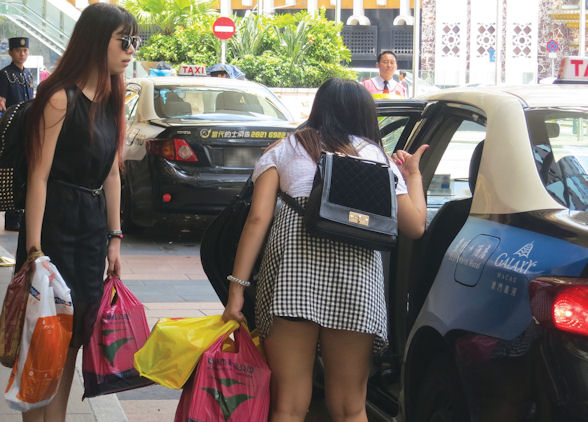
The good news is that they have at least started to address the problem. DSAT and the Macau Office of Legal Affairs (DSAJ) have initiated a public consultation period to review the taxi passenger transport system from 9 August to 23 September. Four key aspects of this include:
- Strengthening the supervisory authority of the public security police. This would enhance efficiency in combatting rogue taxi drivers through police intervention, with the traffic bureau responsible for the administrative process.
- Introducing video monitoring equipment to monitor situations in the taxis themselves. Images would only be used to assist in the investigation of any violations of regulations – and only used when a violation has occurred or a passenger complains.
- Introducing an “undercover” system whereby police pretend to be passengers and can prosecute on the spot if a driver breaks the rules.
- Increasing penalties with fines rising to between MOP$2,000 and MOP$5,000. Some have even suggested an increase to as much as MOP$30,000. It has also been suggested that if any driver breaks the rules three times in three years, their license will be revoked and they won’t be allowed to sit the exam to get their license back for anywhere from one to five years. The current fine for taxis refusing to take passengers or overcharging is only MOP$1,000 and has been since 1999.
Regarding the most controversial aspects of this, the undercover system, the Director of DSAJ, Zhang Yongchun, emphasized the undercover officers planted to combat illegal taxi driver behavior were simply searching for evidence without revealing their identities. They are not trying to lure taxi drivers to overcharge. For example, law enforcement officers take taxis pretending to be visitors. If the driver asks for a big price or takes “detours”, the officers can reveal their identity and obtain evidence. Macau law allows for the undercover system, but the method must be passive. Instigating or inducing the crime is prohibited.
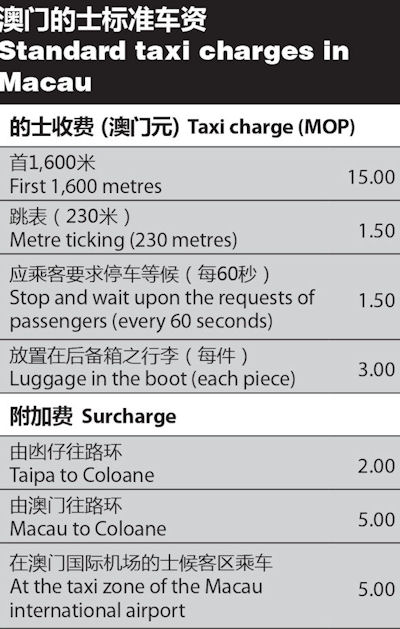
However, while we wait for the Macau government to improve the system, there are some rules you can follow to make it easier to find a taxi in Macau and avoid being ripped off.
- Queue for a taxi at a taxi stand. Taxis at a taxi stand will always go by the meter.
- Walk to the nearest hotel to wait for a taxi, if there are hotels nearby.
- Bring a map. Give yourself a general idea of the distance between your starting point and your destination and more importantly pay attention to the route. This way you will know if the driver decides to take a detour. For your easy reference, there is a map of Macau in the back of this magazine.
- If you believe the fare is not reasonable, you can ask the driver to print a receipt and use it as evidence when you complain.
- Keep the traffic affairs hotline number on you at all times in case you need it. The number is +853 8866 6363.
Social Media helps Macau taxi passengers fight back!
Local Macau residents are fighting back against dishonest taxi drivers with the establishment of the “Macau Taxi Driver Shame” (MTDS) Facebook Group, which is now evolving into the Macau Taxi Passengers Association – a formal community association registered under Macau law.
A local man founded the Facebook group on 30 June 2014 after he and his heavily pregnant partner were forced to wait for hours in the heat while tourists bought numerous taxis just metres away by bribing taxi drivers. Initially it was just a place to vent his anger but within an hour 100 people had joined to support the founder, loudly proclaiming their anger and frustration. Within two days 500 had joined. Today, the group has over 2,000 members irate with Macau taxi drivers and demanding something be done.
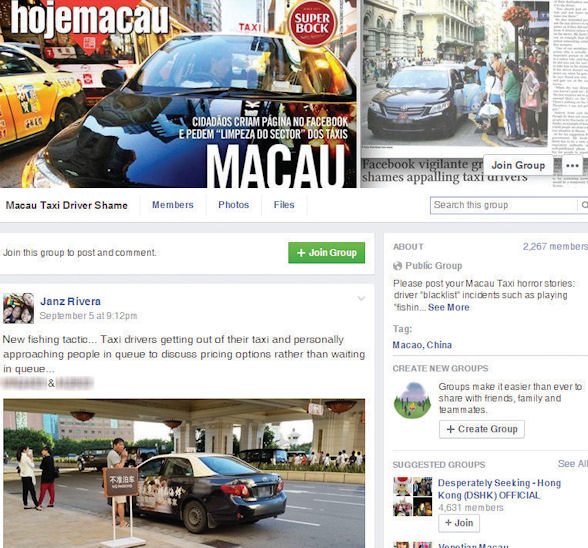
MTDS members started posting descriptions, pictures and videos of bad Macau taxi driver behavior and the group has even published a Black List of 73 bad Macau taxi drivers. Members of the group report overcharging, dangerous driving, poor quality taxis, rude and aggressive drivers and even serious violence. But the most frequent problem is the practice of “fishing” where drivers refuse passengers unless they pay up to 10 times the legal metered fare.
Administrators of the MTDS group have now announced the establishment of the Macau Taxi Passengers Association – for more information please visit Facebook and search for “Macau Taxi Driver Shame”.

